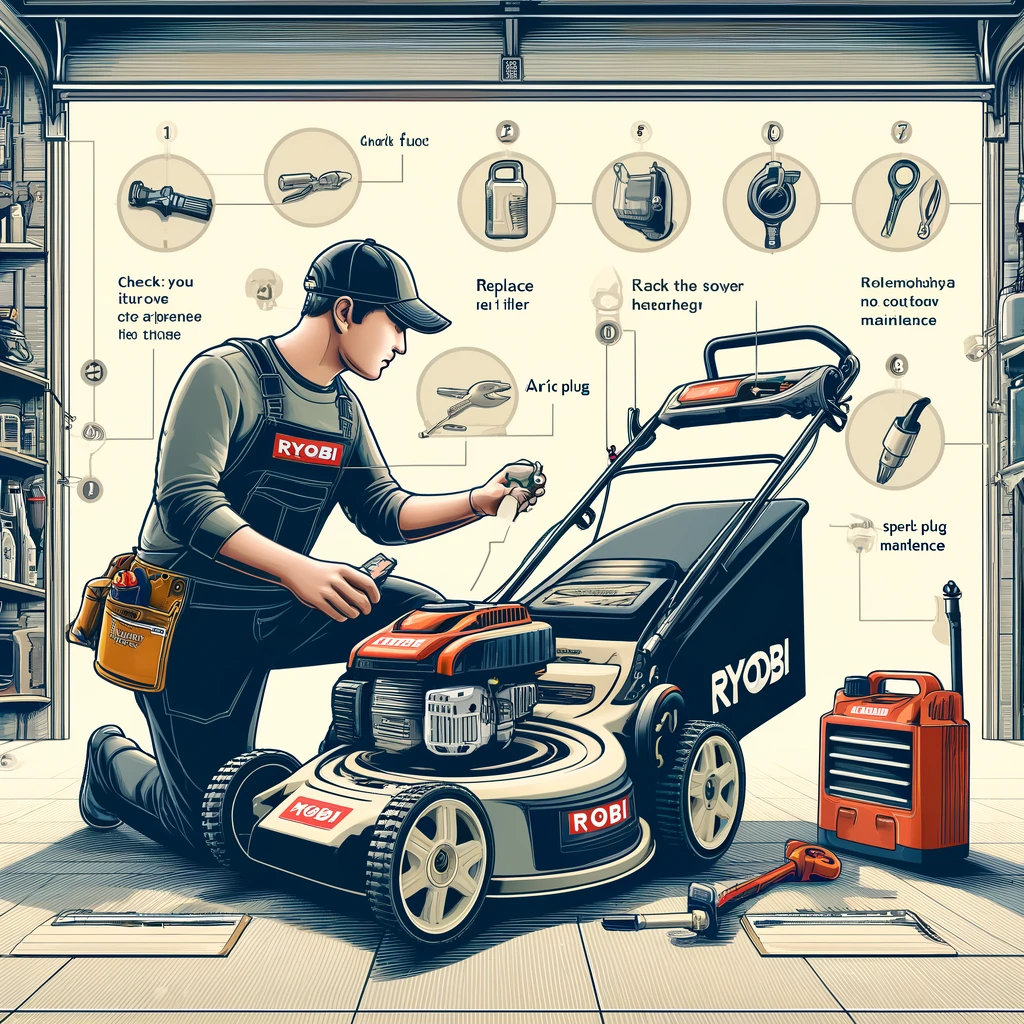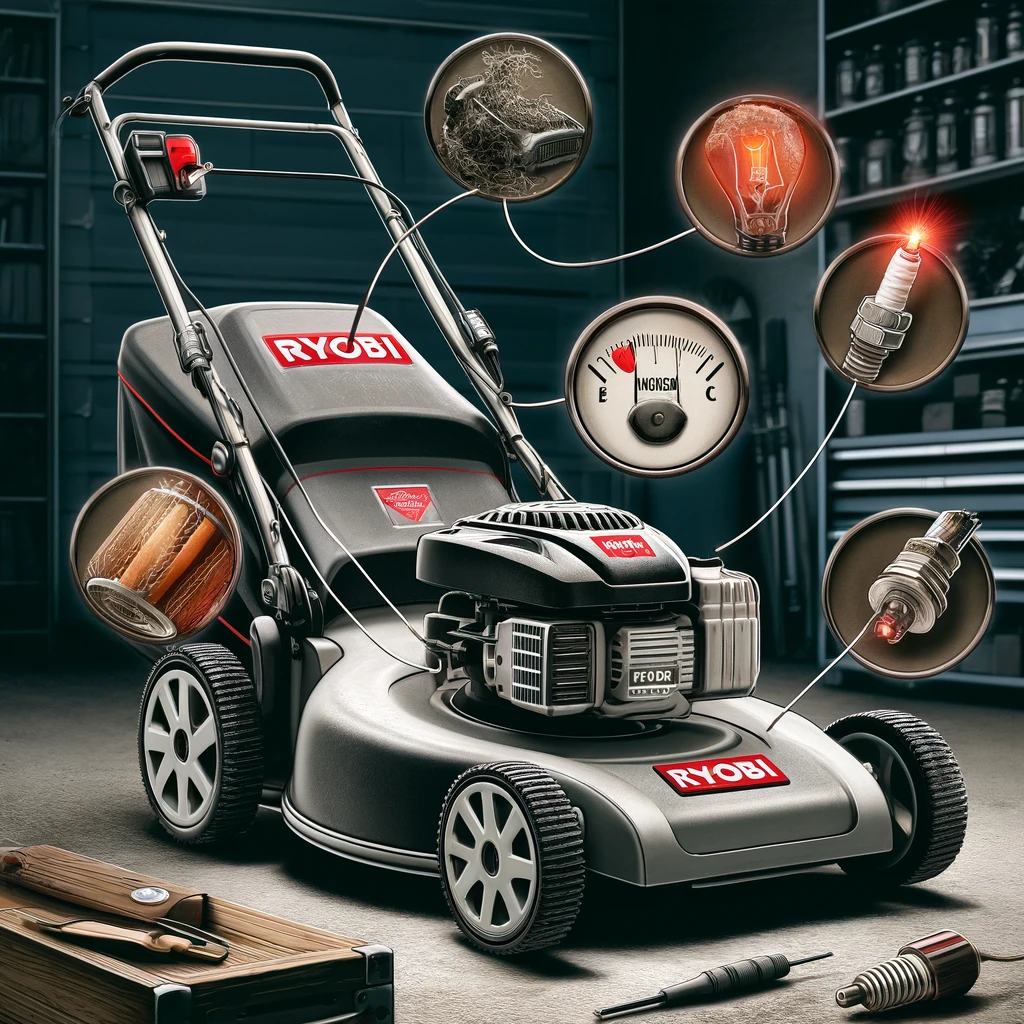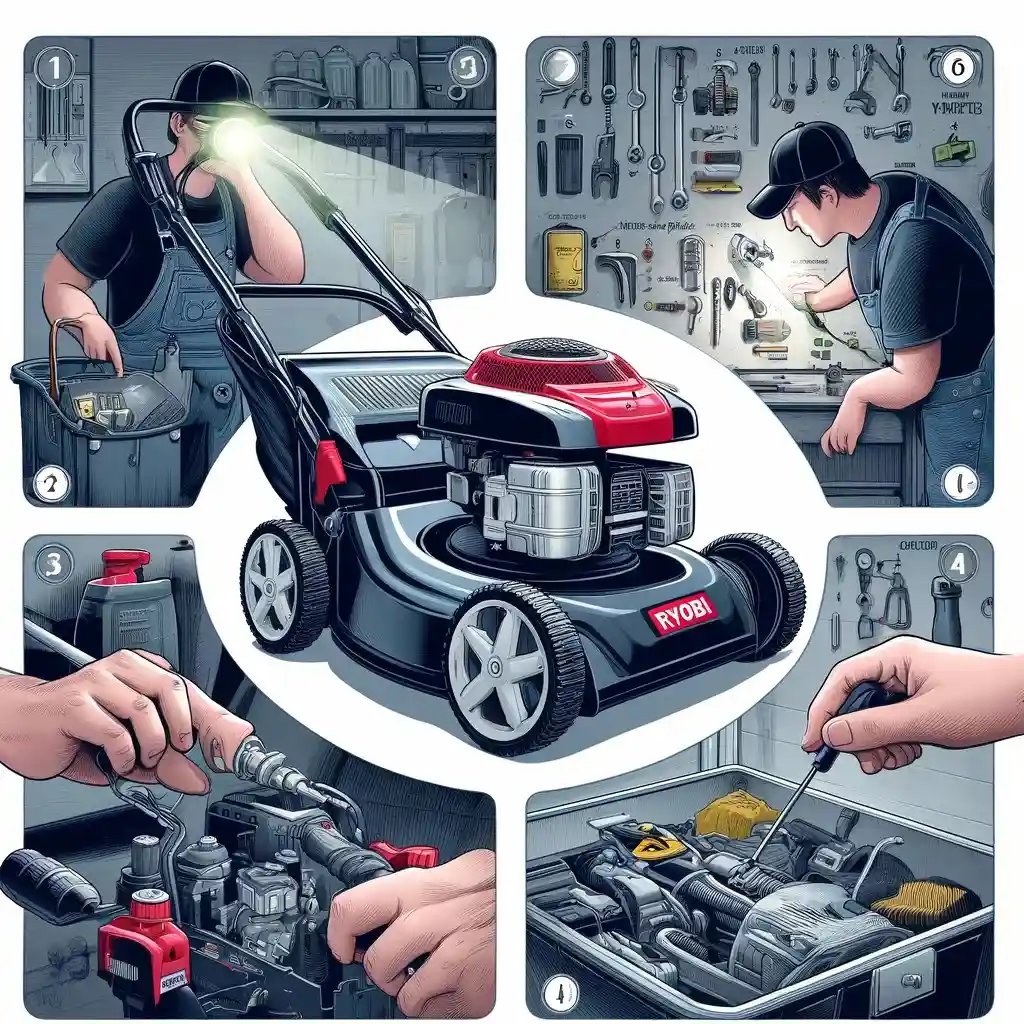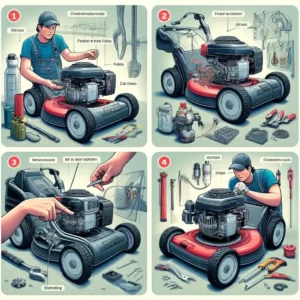List Of Contents
ToggleIntroduction
It can be frustrating and confusing when your Ryobi lawn mower suddenly stops running. Additionally, this simple problem disrupts your routine of taking care of the lawn while it is also a pointer to deeper issues that may affect its ability to run as well as its life span.

Attending to these interruptions immediately ensures the continued efficiency of the machine hence prolonging its useful life and maintaining the good health of the grass. This article will guide you through identifying and resolving the causes of your Ryobi mower turning off as it moves, with practical advice and step-by-step solutions.
Common Causes for a Ryobi Lawn Mower Turns Off

1. Fuel Problems:
Low Fuel: Make sure that there is sufficient fuel in the tank; refuel if low.
Stale Fuel: If gasoline has been sitting in the tank for over 30 days, it can degrade causing poor engine performance. Change old fuel with fresh gasoline.
Water in Fuel: Water contamination can cause engine stalling. Drain the tank and refill it with fresh fuel.
2. Air Flow Issues:
Clogged Air Filter: A dirty air filter inhibits airflow into the engine thus causing the mower to shut off. Clean or replace if too dirty.
Blocked Cooling Fins: The fins are blocked then overheating occurs leading to the mower shutting off by itself. Ensure such fins are free from any foreign materials.
3. Spark Plug Malfunctions:
Dirty or Worn Spark Plug: Engine operations may be disrupted by faulty spark plugs. Remove and inspect; clean it, if dirty, or replace it if worn out.
4. Safety Features Engaged:
Safety Handles: These must be fully engaged for the mower to operate properly.If the lawnmower shuts off check to ensure proper engagement of safety handles.
Malfunctioning Safety Switches: Faulty switches will make the lawnmower stop unexpectedly. Test them and only change those not operating well.
Understanding these common causes will help you diagnose why your Ryobi lawn mower may be turning off during use, and guide you through fixing the issues efficiently. Each section is designed to address specific problems directly, ensuring your mower performs reliably and lasts longer.
Troubleshooting Steps

Proper troubleshooting can save you both time and money by helping you identify the specific issues causing your Ryobi lawn mower to turn off during use. Here are detailed steps to check and resolve common problem areas:
1. Inspecting the Fuel System:
Check the Fuel Level and Quality: Ensure there is fuel in the tank that should not be stale (older than 30 days); if so, replace it with fresh gasoline.
Look for Water Contamination: Drain the tank completely once you suspect water has been mixed with fuel; refill with fresh gasoline.
Inspect Fuel Lines and Filter: Check for any cracks or leaks on fuel lines as well as ensure that the fuel filter does not have debris clogging it. Replace broken lines or dirty filters to facilitate the smooth flow of fuel.
2. Checking and Cleaning the Air Filter:
Locate the Air Filter: Usually found on one side of the engine, open its compartment
Inspection and Cleaning: Take out the air filter, after which knock loose any loose dirt. It is best to replace it if the filter is very dirty or damaged. For foam filters, wash them with soap and water, squeeze the extra water out of it, and allow it to dry completely.
Reinstallation: Put back clean or new air filter in the housing making sure there aren’t any spaces left.
3. Spark Plug Examination:
Removing the Spark Plug: Disconnect the spark plug wire. Use a socket made for removing spark plugs.
Checking: Inspect for signs of wear or carbon build-up. If dirty, clean it with a wire brush; otherwise, replace it with another one in case it’s worn out or not functioning properly.
Gapping: Ensure that the gap on your spark plug corresponds to what is indicated by your manufacturer.
Reinstalling/Screwing Back In Screw back in carefully without tightening down too much & reconnect your spark plug wire(s).
4. Safety Switch Check:
Find The Safety Switches: These are often located under the seat, by the clutch area, or around mower blade mechanisms.
Testing of The Switches: Engage and disengage switches to see if they are operating smoothly. If one does not turn off when it should or does not turn on at all then consider replacing it.
Checking Connections: Confirm that all wires going into and out of these safety switches have not loosened up but are tightly fixed to avoid any interference while using this machine thus causing more danger than protection from accidents.
In this way, you can figure out what’s wrong with your Ryobi lawn mower and address such issues until it works again. However, each step must be done because they will ensure better performance as well as prevent further occurrences from happening again next time.
Issue Fixing guide plus the necessary details
1. Repairing or Replacing Fuel Components:
Cleaning the Carburetor:
Carburetor Removal: First, ensure that the lawnmower is off and close the fuel valve. The carburetor can be accessed by removing the air filter and disconnecting the fuel lines before unscrewing it from its mounting screws.
Carburetor Cleansing: Use carburetor cleaner to spray all openings; remove carburetor bowl wash float and needle ensuring all jets and passages are clear of dirt.
Reassembly and Replacement: When reassembling the carburetor after thorough cleaning, make sure all parts are placed correctly in their positions and fastened properly. Attach fuel lines back to your mower after screwing on its carburetor again
Trace Back Fuel Lines: If there are any cracks or leaks in fuel lines, get new tubes of similar size and type approved for Ryobi mowers.
2. Air System Servicing:
Insufficient Airflow Noticeable:
Washing or Changing Air Filters: As noted earlier on, make sure you got clean/new air filters which facilitate free airflow.
Examine Cooling Fins: Inspect engine cooling fins for any debris accumulation; because lack of airflow causes an engine to overheat this dirt should be removed by brushing with a paintbrush regularly.
Give priority to cleanliness then move on to other considerations which include conducting internal research as well as conducting field research among others
3. Spark Plug Care:
Substituting a Spark Plug:
Extract Old Spark Plugs: Unscrew old spark plugs using a spark plug socket.
Assess New Spark Plugs: Ensure the correct gap according to the specifications of your mower is maintained in the new spark plugs.
Insert New Spark Plugs: Begin by screwing in the new spark plug by hand to prevent cross-threading, then use a socket wrench to tighten but remember not to overtighten.
Fasten Spark Plug Wire: For proper electrical contact, ensure that the spark plug wire is connected securely.
To apply this technique effectively, it has been useful for them to be taught through coursework and/or professional development
4. Adjust or Replace Safety Switches:
Safety Switch Testing and Replacement:
Locate and Test: Find all safety switches (commonly found under the seat, around clutch or blade mechanisms) and check their continuity with a multimeter.
Replace as Required: Change out any safety switch that failed the continuity test with one according to your model’s requirements.
Make sure it is correctly connected: After changing the old one make sure that all cords are well-attached together and when engaged it operates accordingly.
The detailed steps above can let you know why your Ryobi lawn mover might cut off while moving regularly. Keeping up maintenance at regular intervals as well as providing unswerving service for repairs will keep your machine in optimum condition leading to beautiful gardens.
Conclusion
For optimum performance over many seasons of caring for your lawn, maintaining the Ryobi lawnmower is highly necessary. Not only does regular maintenance help prevent common mower issues like sudden stopping, but also improves the overall dependability and efficiency of machines used in this process.
By responding promptly to issues that arise and performing routine checks you are protecting your investment while maintaining an attractive yard. Continue being proactive about taking care of your lawnmower so that it remains an important tool within gardening at your disposal.
FAQs
Q: Why does my Ryobi lawn mower keep shutting off?
A: It could be due to problems with the fuel supply, clogged air filters, bad spark plugs or active safety measures. Refer to the troubleshooting section for detailed checks and how-to-fix-them tips.
Q: How often do I need to clean or replace my air filter?
A: Check the air filter every 25 operating hours and clean or replace it as necessary for optimal airflow and engine performance.
Q: What if my mower starts and then dies?
A: This is often related to fuel system or carburetor issues. Make sure your gas is fresh and your carburetor is clean. The steps for doing these are found under “Repair or Replace Fuel Components”
Q: How can I tell if my lawnmower’s spark plug needs replacing?
A: Look at the spark plug for wear or deposits. A dirty, worn-out spark plug may cause starting problems or engine misfiring. Go through the Spark Plug Maintenance section on how to replace it.
Q: Can a bad safety switch make my lawn mower die out?
A: Absolutely. When safety switches act up they can give a false indication that a safety measure has been violated making the mower stop working. Testing and replacing Safety Switches Adjusting covers this.
By using these FAQs together with the guidelines given in this post, you will be able to troubleshoot common issues with your Ryobi lawn mower and keep it running smoothly while taking care of your lawn area.
Read more information about the Ryobi lawn mower












Leave a Reply